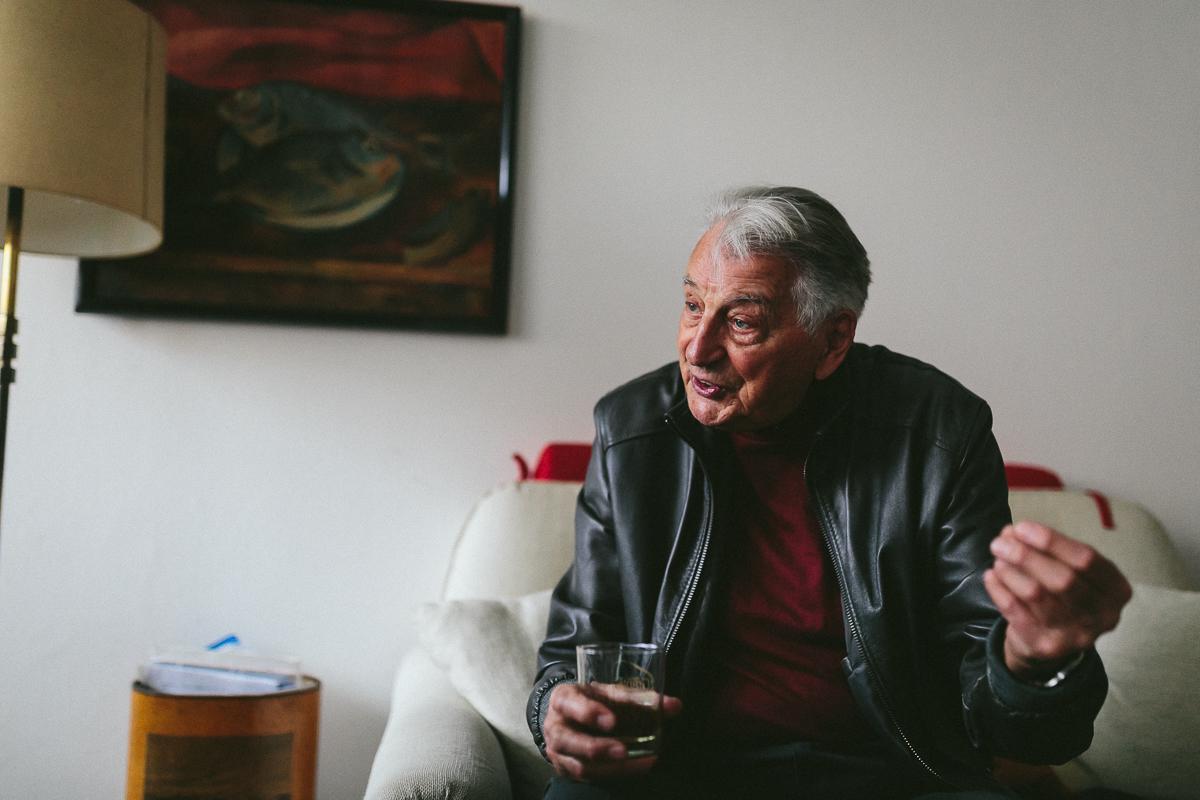
Theater represented a job: Every day you had to show up at rehearsals at that time and that time, and you had to play a role whether it suited you or not. On the other hand film is improvisation. It's a thing for individualists. And I am an individualist.

I remember when I used to go to the cinema as a young boy: French films from that period had a totally different approach. It was the time of Jean Renoir, Jean Gabin, who is still a remarkable acting icon, with extraordinary charisma. I'm happy to still have some of his films. That was the time of the great French actors.
He welcomed us in his home in Šiška with a smile, nicely dressed as always down to the last detail. Despite the early hour, he offered us a shot of whiskey. The whiskey and cigar have been an inseparable part of his daily routine for more than 60 years. While looking for the glasses, he nodded with praise, that whiskey is drunk without ice. "You know, the Scots would be totally appalled, if you were to put ice in their whiskey. The Americans, with their big refrigerators, came up with that idea," Bitenc protested. As you go through his remarkable life in less than two hours, one asks whether he has ever considered publishing his memoirs. His career ranks amongst the most fruitful: he has identified himself with film and stage characters home, and mostly abroad, for more than seven decades. He has literally lived a life like from the films. He has portrayed more than 230 roles. He is most known for his character roles in foreign productions.
He's private life has been as colourful as his career. However, as one could expect, true to his manners, he replies that writing about the women of his life would be indiscreet. "Those women have given me something, something honest, and by writing about them it seems I would offend them. I spent very nice moments with them, and that is my treasure."
This extremely hale and hearty gentleman spends his evenings at various social events and functions. "That's how you maintain you contacts and meet new people," is how he explains the main reason why he leaves the shelter of his own apartment to be part of the social scene. He still enjoys watching a good film. Both on TV as well as on the big screen. Our conversation focused on film, just before the opening of this year's Ljubljana International Film Festival.
Until a few years ago Bitenc was a regular presence at the opening ceremonies. He now admits that he has somewhat neglected the festival. "I don't like to plan things, I like to be spontaneous, and because of that there is always the problem of whether any tickets will still be available."
You've made films with very different directors, who have all had their own approaches to film. Is there a film director that still holds a special place in your heart?
A director, with which I've worked lot and has had a great influence on my career, is certainly Guido Malatesta. I made ten films with him; however he sadly died after that. He was the godfather on the Italian film scene. It's interesting to know that it did happen for him to write a role for me which I did not get at the end. Why? Because that was a period in Italy, and in the B film production industry in general, when it was a rule to take on an American actor for the leading role because of the bigger market. At the same time a law was also in place which financially benefited films with Italian actors. So the rule set the practice for a certain percent of Italian actors to be in every film, for it to be entitled to tax reliefs. So films only had a few roles available for foreigners. If it did happen for more foreigners to act in an Italian film, it would then lose its state subsidy. We here never had a system like that.
It's sad for a society when it comes to a point that it thinks it no longer needs culture, and stops investing in it. I think that today, especially in the 21st century, it is precisely culture which gives nations their identity. Not to the state, but to the people. I think that the only way for a people to survive today is through culture. I myself see it as matter of civilization and culture. A civilization is a thing of the intellect, a culture is a thing of the heart. And when the importance of the intellect surpasses the importance of culture, things collapse. If you look through history it is clearly evident - expansive nations with no culture have vanished: the Avars, the Huns. If you look at the history of the Roman Empire and see the scandalous state it was in prior to its end, it is clear that the empire started decaying from within. And that started happening when civilization surpassed culture.
In Slovenia there is much talk about the importance of culture, but sadly very little is done. We as Slovenes have survived and preserved our language for 500 years. The farmer has preserved his language and our culture developed from that. In hurts me today when I see at home how Slovenian language gives way to English. It's great that you speak so many languages, however when you're home, your language should not only come first, but be blessed.
Did it ever disturb you that you played the roles of so many villains?
I don't make too much fuss about the acting profession, especially on film. To me it isn't a profession and it isn't a job. It's a life mission. You have to master your craft, your »metier«. Apart from talent, hard work is key. Michelangelo was a genius, but he was also a craftsman, in a positive way of course, and he knew his work inside out. And that's the way it is with acting. An actor moves from one role to another. I played many villain roles abroad and it delighted me. You're able to live out something you otherwise never would; something you would eventually suppress. An actor creates; therefore you create your character. And because of that I was never interested in acting in romantic films (laugher).
What is film to you? You've been following its development and growth for more than seven decades now.
Essentially a film is a factory of dreams. During its growth period, after WWI, film production was in search of ambience. And in cinemas you found yourselves in an area which literally forced you to watch the big screen. If you watch a film at home, you lose concentration real fast.
Hollywood’s commercial films were basically made for the big screen. The divide between commercial films and art films came later. Regarding art films Europe's production has always been more powerful. However in the period around both of the World Wars, Hollywood's film production bought up a lot of Europe's cinemas and, thus, ensured higher viewership than Europe's films.
In the period when I worked the most, film production lived off its B production. Then in the seventies that part of film was taken over by TV. Huge profits were taken away from producers. The likes of Ponti, De Laurentiis and other directors made around ten commercial films, to be able to make one film which would »define« them. But they lived off B production.
After that, at the turning point, there were only two possibilities: you would either make small films with small budgets, or make big pompous films. Americans decided to start creating spectacles. And I always repeat this, and this is not blasphemy: American spectacles are basically destroying Europe's production. It is true though, that their films are so spectacular and edited technically to perfection, that viewers really do enjoy them. It is also a fact that many big acting names play in these movies.
Your life is like out of a film and calls for it to be written down. Have you ever thought about writing a book?
Others have, I haven't (laughter). At the moment there are some Germans who are trying to persuade me to prepare a book. The fact is that my thinking process is so fast, that I just couldn't write down all my thoughts that quickly. My life has been very colourful, together with all the scandals both at home and abroad (laughter), and inseparably connected with film. But if I would write a book and write only about film, so much has already been written about it, that it doesn't appeal to me. And if I would write only about my whole personal life, that would be indiscreet. The women of my life have given me something, something honest, and by writing about them it seems I would offend them. I spent very nice moments with them, and that is my treasure.
Theater represented a job: Every day you had to show up at rehearsals at that time and that time, and you had to play a role whether it suited you or not. On the other hand film is improvisation. It's a thing for individualists. And I am an individualist.
I remember when I used to go to the cinema as a young boy: French films from that period had a totally different approach. It was the time of Jean Renoir, Jean Gabin, who is still a remarkable acting icon, with extraordinary charisma. I'm happy to still have some of his films. That was the time of the great French actors.



































































